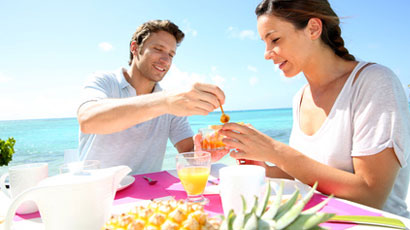Food Tips for the Traveler
Submitted on October 8, 2013
Gastric problems can ruin an otherwise perfect vacation. Here are a few tips to help you avoid Traveler's Tummy!

All your bags are packed and you may be ready to go but before you head out keep these tips in mind to prevent ruining your holiday with an unpleasant stomach upset. Whether you are roughing it out and backpacking across exotic lands or you prefer to play safe and are going the five-star route, there is always the chance that you may pick up a nasty tummy bug en route. To avoid spending most of your trip under the weather, follow these simple food tips for travelers to eat safely and enjoy your holiday:
- The Heat is On: While it may be tempting to bite into that delicious looking fruit at the local market or indulge in a platter of sushi at that quaint local eatery, be smart and walk away. Raw and improperly washed or cooked food can contain harmful bacteria, viruses or parasites. Travelers should eat only hot foods, cooked or washed fruits and baked goods. Apart from raw fruits and fish, it would be prudent to also avoid dairy products, leafy salads, uncooked meats, runny eggs, and foods standing at room temperature for a long time such as those found in sandwiches or restaurant buffets.
- Water, Water Everywhere: The CDC (Centers for Disease Control and Prevention) recommends checking the safety of local water and guidelines to potability when traveling to developing countries. As a rule, boiling water when traveling is a reliable way of treating contaminated water. If boiling is not possible, use pre-packaged iodine or chlorine water treatments to ensure safe drinking. Local water, ice cubes and non-pasteurized milk should be steered clear of. Wash and brush your teeth with filtered water as well.
- Keep it Clean: Though you may be dying to try out the local cuisine from them many street vendors around, it is better that you don’t. Try and avoid foods sold on the street and even more if the person handling the food seems unhygienic.
- Hand Wash: Always wash your hands regularly when traveling. Use a hand gel or soap wash that contains more than sixty percent alcohol before and after eating or handling any food and after using the washroom.
- Add to Your To-Do List: Foods that are generally considered safer to eat on the go are nuts and foods with shells, fruits with peels, dairy products stored in sealed containers, hot tea and coffee (preferably taken black), condiments such as ketchup or mayonnaise found in sealed packages, and alcoholic drinks such as beer or wine (though check the alcohol content first as such beverages may be more potent than those available in your home country).
- Pick and Choose: When choosing a restaurant, look around you. If you see a café or a restaurant with a lot of people, it may be safe to assume that the food available is good. There are a number of social media sites available online providing sound advice on where and what to eat when traveling. That said; you should still ask the waiter or chef to serve the food hot and heated thoroughly. If you can’t speak the local language, make sure you brush up on a few popular phrases before traveling to avoid potential disasters. If you have any food allergies or are intolerant to a particular food group, please inform the wait staff immediately. Alternatively, it may be wiser to purchase your own food at a local grocery store.
In addition to the above tips, there is also a two page checklist issued by the FDA that is available online that can be carried along on your travels. http://www.fda.gov/consumer/updates/travel_health062308.pdf.
References: